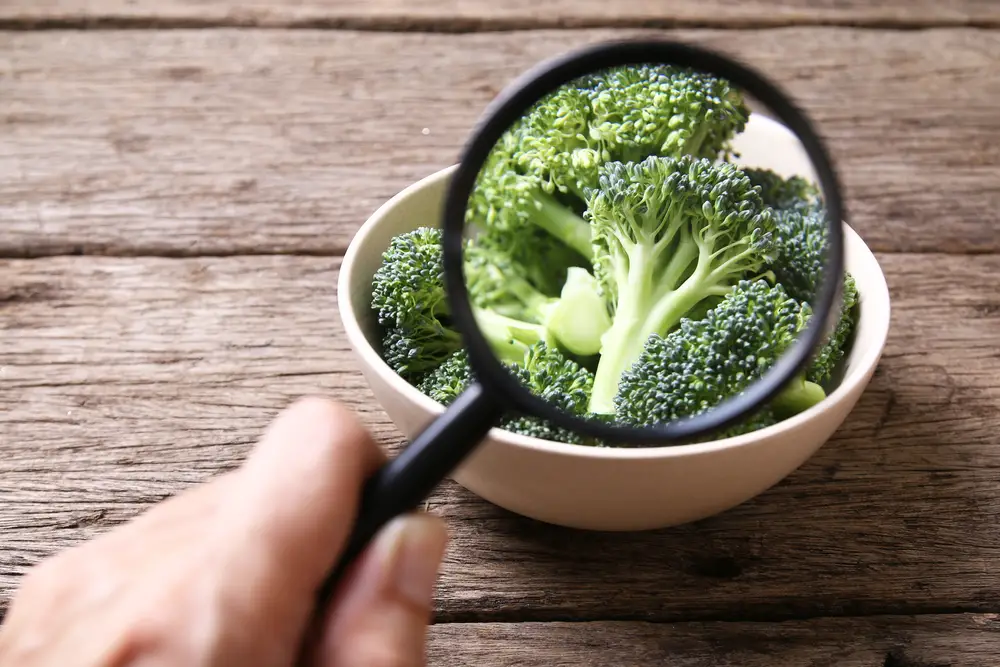Is broccoli man-made? These days, when we hear that a plant is man-made, most of us immediately think of GMO (Genetically Modified Organisms) crops.
But there are many ways to modify plants using completely natural processes to create a new variety. The broccoli we see in the market today was developed through this natural process.
In this article we’ll delve into the background of this common vegetable and explore its origins, related plants, tips on growing, and its health benefits too!
To most of us, especially those who are new to gardening, the vegetable we know as ‘broccoli’ has the form of a large round green head (think cauliflower, only dark green.) That’s the common one grocery stores sell under the name broccoli.
To those of us who grow our own vegetables, however, broccoli also comes in another form. There’s a taller, more open vegetable plant called purple sprouting broccoli often grown in gardens in zones where the winters don’t get quite so cold.
We’ll discuss the different varieties later. For the purposes of discussing whether broccoli is man-made, we’ll consider both forms.
What Is Broccoli?
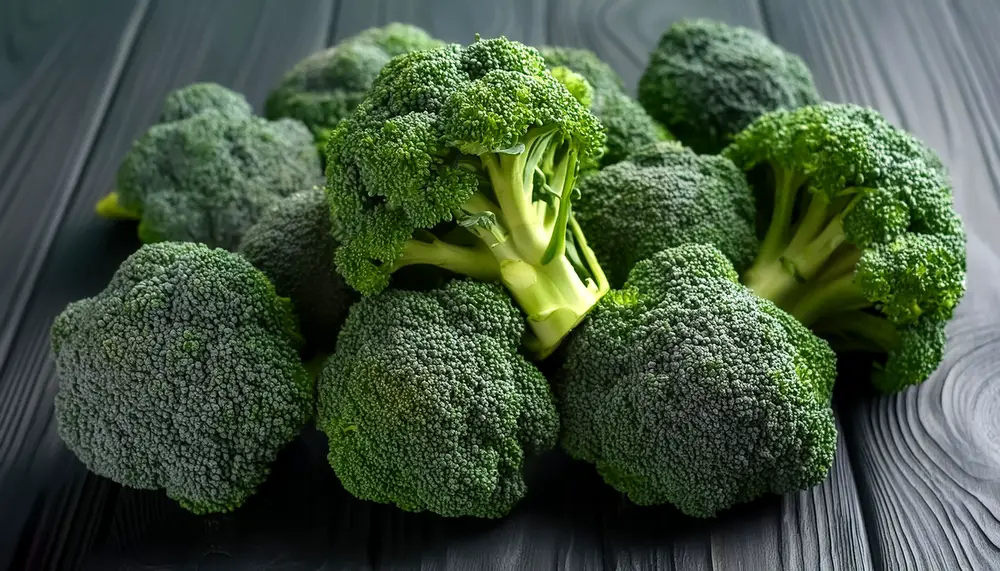
Broccoli is a green vegetable in the plant family Brassicacea. Other vegetables in this family include:
- Cabbage (Brassica olearacea Capitata)
- Kale (B. olearacea Acephala)
- Brussels sprouts (B. olearacea Gemmifera)
- Cauliflower (B. olearacea Botrytis)
- Collard greens (B. olearacea Viridis)
- Kohlrabi (B. olearacea Gongylodes)
- Turnips (B. oleracea Rapifina)
You’ll notice that all of the vegetables above are all varieties of the same plant Brassica olearacea. It’s hard to believe that plants that look as different as kale and cauliflower could be so closely related!
In fact, all the brassicas are descendants of a single plant called wild mustard (or wild cabbage), Brassica oleracea.
Types of Broccoli
Most of us are familiar with the dense green head labeled ‘broccoli’ in the grocery store, but the name isn’t quite accurate. This vegetable is more correctly known as Calabrese (Brassica olearacea Italica). The other broccoli plant is known as purple sprouting broccoli (Brassica olearacea Cymosa).
Calabrese
This is the form we find in the stores, the classic dense green head. It is just about always sold under the name ‘broccoli’ but the correct name of this variety is Calabrese, Brassica olearacea Italica. It grows as a dense bushy plant with one main central head that gets harvested in one go.
The head is a dense cluster of flowering stems known as florets.
Purple Sprouting Broccoli (Cymosa)
The other form, the true broccoli, is called purple sprouting broccoli, Brassica olearacea Cymosa. It produces much smaller multiple heads (or spears) on a larger, more open plant.
These individual spears get harvested over a period of several weeks. They’re not as dense as the Calabrese head, and tend not to keep as well. So the only place you might find purple sprouting broccoli spears for sale is at a local farmer’s market in the spring.
For the purposes of this article, we’ll include both types of broccoli when considering the question: Is it a man-made plant?
Is Broccoli Man-Made?
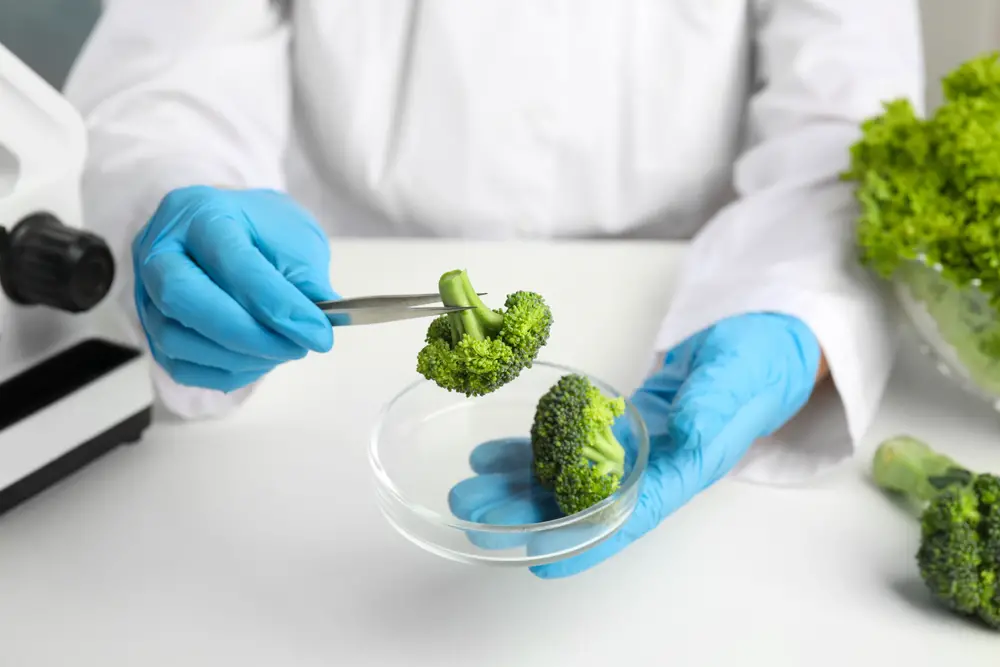
The short answer is yes, Broccoli is man-made but no, it’s not a GMO. Gardeners will be familiar with the term ‘hybrid’ used to refer to a plant that has been developed by cross-pollinating two parent plants to create a new ‘hybrid’ offspring.
And sometimes a new plant simply develops as the result of its natural genetics. One plant stands out from all the others grown from the same batch of seeds.
What Is A GMO Plant?
We’ve all heard the term GMO (Genetically Modified Organisms) but there’s a lot of confusion about what this term really means.
Put simply, a GMO plant is one whose DNA has been modified in a laboratory setting using genetic engineering. It’s a complicated process of modern science.
By contrast, pollinating one plant with another plant in the same family – a process known as cross-pollination – is a completely different thing from GMO.
History Of Artificial Selection (Or Selective Breeding)
We humans have been manipulating the traits of our agricultural crops for thousands of years. Obviously, the ancient Romans and other lost civilizations didn’t have our modern-day scientific laboratories to tinker with plant DNA. Still, they were able to develop new strains of crop plants that better met their needs, like drought-tolerance, higher yields or pest resistance.
They did this through a process called ‘artificial selection,’ also known as selective breeding.
Artificial selection is a process where growers choose to breed plants that have more favorable characteristics. For vegetables and other crops, that would be things like:
- Better drought tolerance
- Disease resistance
- Higher yield
- Better flavor
- Bigger fruit or root crop
Gardeners will be familiar with the concept. If you’ve ever grown garlic, for example, you’ve probably kept the biggest bulbs with the biggest cloves to plant for next year.
In ancient times, a select few plants remained healthy during a drought while the rest of the plants may have suffered or died. Farmers saved the seeds from these healthy plants and planted them the following season. If there was another drought, again the farmers saved the seeds of the plants that remained healthy. And so on from year to year, until eventually all the plants each season were reliably drought-tolerant.
Artificial selection is a slow process, often taking several generations of a plant to develop a stable new genetic make-up and to reach the desired result. But it is a natural process helped along by human intervention.
Artificial Selection Today
These days, we have a better understanding of plant genetics and reproduction. New varieties are developed by deliberately cross-pollinating two parent plants with desirable traits to create a new offspring plant.
The offspring plant will contain genetics from both parents. The offspring’s seeds are then planted to see what new plants it will grow. And so on.
The History Of Broccoli
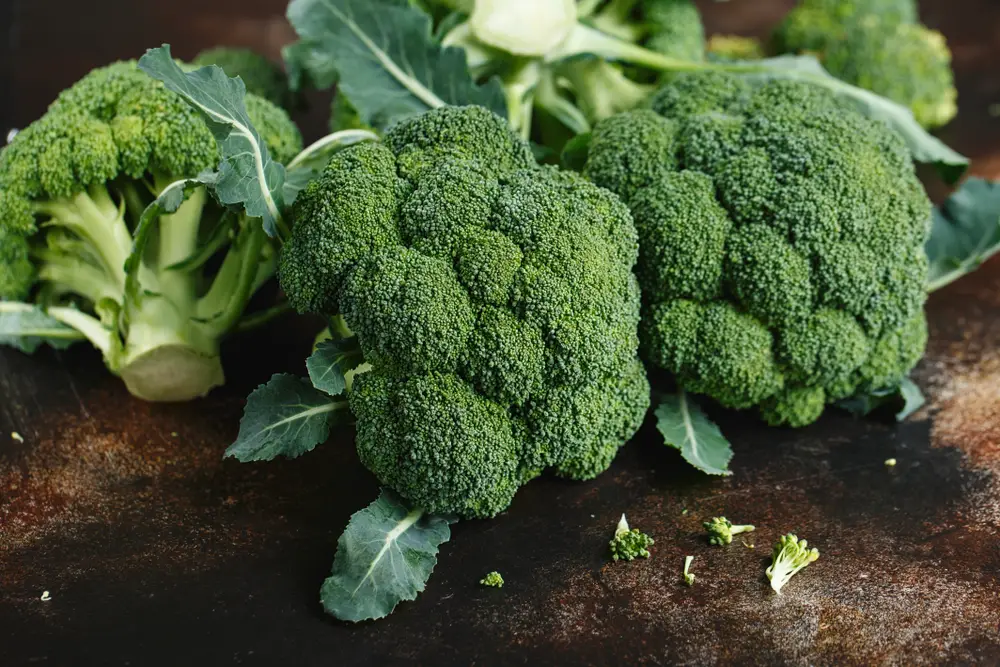
Modern-day Brassica plants are all a result of artificial selection. They all trace back to one plant, wild mustard (or wild cabbage), Brassica oleracea.
Origins
It is believed that Calabrese (B. olearacea Italica variety) was first bred in Tuscany about 2,000 years ago. Hence, its common name, Italica.
From there it spread through Europe in the 18th century, and reached the United States in the early 19th century.
It didn’t become the mainstream vegetable it is today until the 1920’s, when it arrived with immigrants from Italy.
Varieties Today
Today, new cultivars continue to be developed, some that are more cold hardy, others that can be harvested earlier (i.e. they have fewer days to maturity) and others that have richer flavor or higher nutrient content.
Over the centuries, humans selectively bred this one plant to enhance different desirable traits. These include:
- Bigger leaves
- Tighter flower heads
- Smaller axillary buds
- Earlier harvest
- Drought tolerance
Brassica Family
As a result of cultivating wild mustard, we now have several different Brassica varieties, including:
| Common Name | Scientific Name | Plant Part Enhanced (compared to the original wild mustard) |
|---|---|---|
| Calabrese | Brassica olearacea var Italica | Flower heads |
| Purple sprouting broccoli | B. olearacea var Cymosa | Flower heads |
| Kale | B. olearacea var Acephala | Leaves |
| Brussels sprouts | B. olearacea var Gemmifera | Axillary buds |
| Cabbage | B. olearacea var Capitata | Tight clusters of leaves |
| Cauliflower | B. olearacea var Botrytis | Flower head |
| Kohlrabi | B. olearacea var Gongylodes | Swollen stem base |
| Collard greens | B. olearacea var Viridis | Leaves |
| Turnips | B. olearacea var Rapifina | Roots |
Broccoli’s Botanical Characteristics
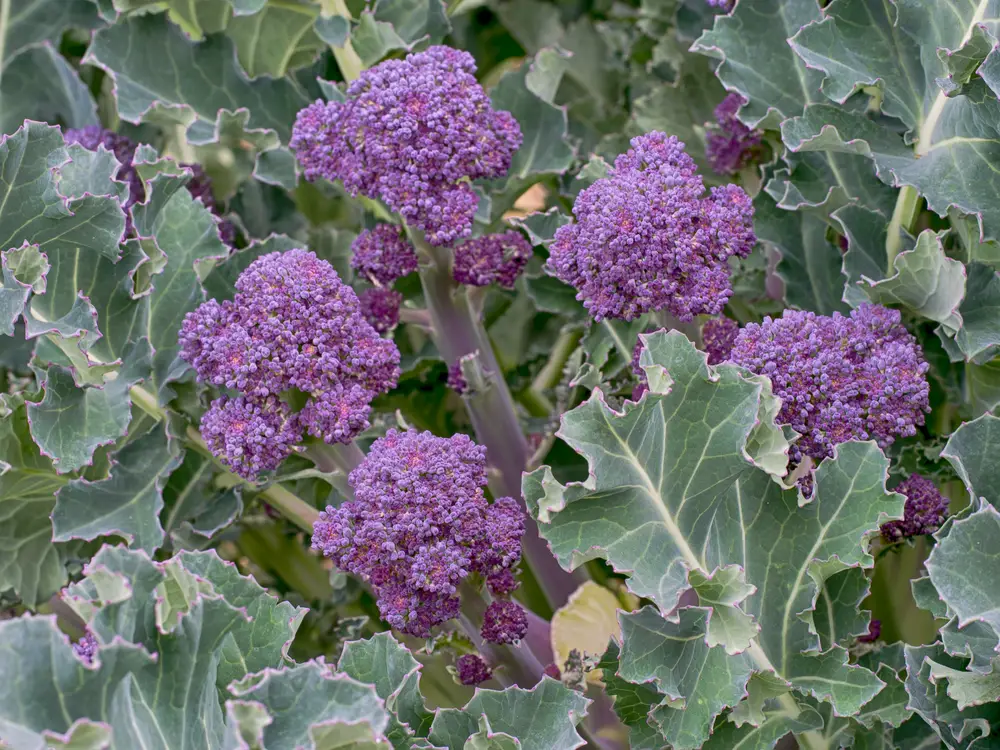
Is Broccoli A Flower?
Generally, the part of the plant we eat is the stalk and unopened flowers.
What we call a ‘head’ or ‘spear’ of broccoli is made up of tight clusters of unopened green flower buds.
You may have heard of florets or read about them in recipes. “Floret” simply means a small flower, often one that is part of a larger flower.
Plant Parts
The entire plant can be eaten, including:
- Leaves
- Stalk
- Florets
- Flowers
All parts of the broccoli plant are highly nutritious and delicious!
Health Benefits of Broccoli
Broccoli has lots of health benefits. It’s an excellent source of vitamins C and A. Just one cup contains twice the recommended daily allowance of Vitamin C.
It’s also a great source of:
- Calcium
- Riboflavin
- Folic acid
- Iron
- Fiber
There are lots of delicious ways to prepare broccoli. It can be eaten raw in salads or with a dip. Plus eating it raw gives the best nutritional boost. It can also be lightly steamed, blanched in boiling water, tossed into a stir-fry or added to cheesy baked casseroles.
How To Grow Broccoli
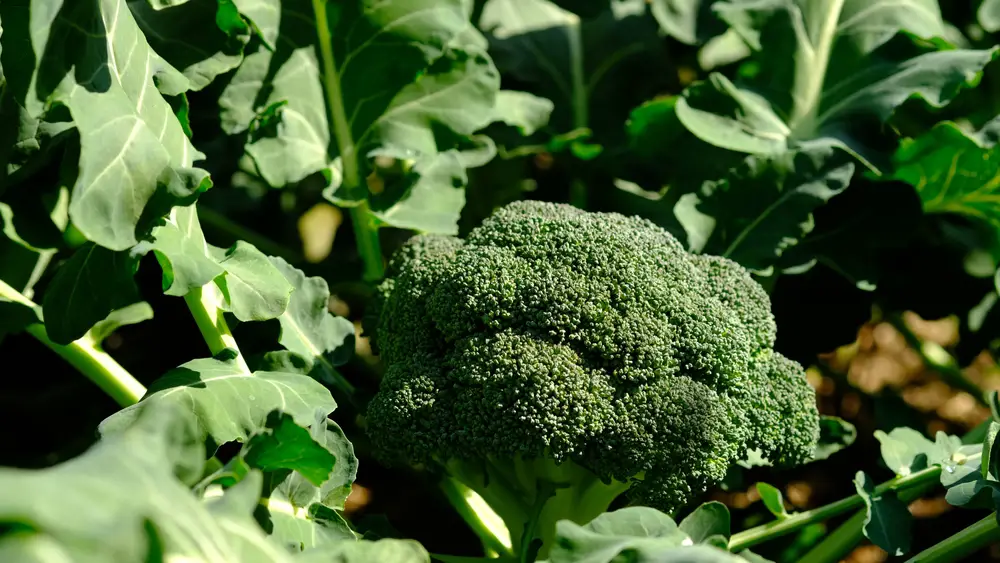
Broccoli varieties have the same cultural requirements for healthy growth. Where they differ is their time of planting and harvest.
First, let’s look at their growing needs:
| Light | Full sun |
| Soil | Rich in organic matter. Not too loose.Apply compost or manure several months prior to planting. |
| Fertilizer | Apply general fertilizer before sowing seeds or setting transplants. One small flower heads begin to show, apply fertilizer higher in phosphorous (P) and potassium (K) |
| Watering | Keep plants well watered during dry periods. Apply mulch around plants to maintain moisture. |
| Maintenance | Cover plants with insect netting right down to the soil as soon as they are planted, to protect from cabbage root fly in the spring. And to protect plants from cabbage moth throughout the growing season. |
Growing Calabrese Broccoli
Calabrese broccoli is the large-headed variety we’re most familiar with. It’s a cool-season crop, meaning it prefers to grow in temperatures between 65 and 80 degrees fahrenheit (18-27 C). So it’s generally planted in early spring or mid-Autumn to avoid the heat of the summer.
When the temperature goes above 75-80 F (24-27 C) for an extended period and the soil gets too warm, the broccoli will bolt (go quickly to flower) and you’ll miss out on harvesting the tasty tight-budded heads.
Plant
Calabrese varieties don’t transplant well, so direct seeding in the spring is the preferred strategy. (You can still grow them from small transplants if you treat them carefully when you plant them out.) As soon as seedlings emerge, cover the rows with insect netting. Seal the netting right down to soil level to protect the plants from cabbage root fly and to prevent birds pecking the seedlings.
Leave the insect netting in place throughout the growing season to protect maturing plants from white cabbage moth over the summer and fall.
Mulch
Once the seedlings are several inches high, apply a thick layer of mulch around the plants. This holds moisture in the soil so the plants don’t dry out.
Also, mulch helps keep the soil cool, which in turn prevents the plants from bolting.
Harvest
Harvest from late-summer to mid-autumn, depending on the variety. Cut the large heads (spears) when the buds are still tight and firm, before the flowers open.
Cut the large central flower head first, to encourage the growth of more side shoots. Harvesting may continue up to six weeks, depending on growing conditions.
Growing Purple Sprouting Broccoli
Purple sprouting broccoli is different from Calabrese varieties. It’s hardier and can withstand colder temperatures. It’s generally planted in mid-summer in regions with more temperate winters for a harvest in late-winter into spring. It is a cut-and-come-again plant; as the spears are harvested, more will grow.
Purple sprouting broccoli is direct seeded in the garden in mid-April through mid-May or transplants are planted in early-mid summer. The plant is harvested the following spring.
The individual flower spears are cut when the buds are still tight. If left for the flowers to open, the flavor diminishes and becomes bitter.
Harvest should continue for several weeks, as long as spears are cut while they’re still in bud. Once they begin to flower, production will stop.
Why Is My Broccoli Flowering Early?
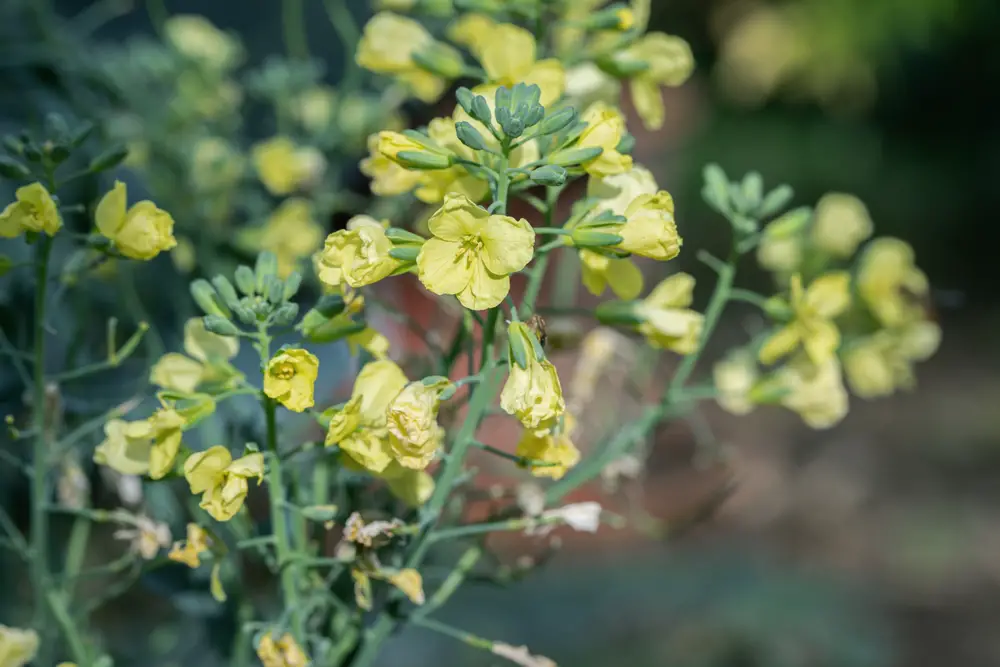
When temperatures get too hot, above 75-80 F (24-27 C), rather than slowly develop tight-budded flower heads, broccoli will bold and send up taller looser flower heads.
When this happens you’ve missed the tasty tight-budded heads.
Once the buds start to turn yellow, the flavor will diminish and become bitter. If they go completely to flower, the flowers can still be eaten, but their flavor is more bitter than the unopened buds.
Can You Eat Broccoli Flowers?
As we’ve already discussed, the broccoli heads we eat are made up of the flower buds before they open. If the heads aren’t harvested, the buds will eventually open into small yellow flowers.
These small flowers and their stems are also edible but the thicker stalks get a bit too stringy and don’t taste great. The small flowers can be added to salads or other recipes. The taste is a little more bitter and the texture will be different. Also, they don’t contain as many nutrients as the unopened buds we usually eat.
How To Stop Broccoli From Bolting
Calabrese broccoli is a cool-season crop. That means it grows best in cooler temperatures. Once the temperatures get too hot, and the soil warms up, the plants will bolt and send up taller looser flower heads.
To prevent Calabrese from bolting, plant it in early spring or mid-Autumn, depending on your growing zone. You want to avoid temperatures over 75-80 degrees F (24-27 C) at the time when the budded heads are developing.
Also be sure to give the plants a thick layer of mulch to hold in moisture and keep the soil cool.

